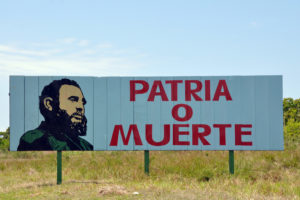
You have surely seen video on your favorite news program of BLM and Antifa protesters tearing down statues of America’s founders and past leaders.
The mob’s wrath has even hit statues of abolitionists like Hans Christian Heg, and inexplicably, that of famous black abolitionist and former slave, Frederick Douglass.
But while BLM and Antifa attack America’s past, they celebrate the deeds of brutal Marxist dictators like Fidel Castro. Here’s a letter written by the Black Lives Matter Global Network after Castro’s death in 2016 (my emphasis added in bold):
We are feeling many things as we awaken to a world without Fidel Castro. There is an overwhelming sense of loss, complicated by fear and anxiety. Although no leader is without their flaws, we must push back against the rhetoric of the right and come to the defense of El Comandante. And there are lessons that we must revisit and heed as we pick up the mantle in changing our world, as we aspire to build a world rooted in a vision of freedom and the peace that only comes with justice. It is the lessons that we take from Fidel.
From Fidel, we know that revolution is sparked by an idea, by radical imaginings, which sometimes take root first among just a few dozen people coming together in the mountains. It can be a tattered group of meager resources, like in Sierra Maestro in 1956 or St. Elmo Village in 2013.
Revolution is continuous and is won first in the hearts and minds of the people and is continually shaped and reshaped by the collective. No single revolutionary ever wins or even begins the revolution. The revolution begins only when the whole is fully bought in and committed to it. And it is never over.
Revolution transcends borders; the freedom of oppressed people and people of color is all bound up together wherever we are. In Cuba, South Africa, Palestine, Angola, Tanzania, Mozambique, Grenada, Venezuela, Haiti, African America, and North Dakota. We must not only root for each other but invest in each other’s struggles, lending our voices, bodies, and resources to liberation efforts which may seem distant from the immediacy of our daily existence.
Revolution is rooted in the recognition that there are certain fundamentals to which every being has a right, just by virtue of one’s birth: healthy food, clean water, decent housing, safe communities, quality healthcare, mental health services, free and quality education, community spaces, art, democratic engagement, regular vacations, sports, and places for spiritual expression are not questions of resources, but questions of political will and they are requirements of any humane society.
Revolution requires that the determination to create and preserve these things for our people takes precedent over individual drives for power, recognition, and enrichment.
A final lesson is that to be a revolutionary, you must strive to live in integrity. As a Black network committed to transformation, we are particularly grateful to Fidel for holding Mama Assata Shakur, who continues to inspire us. We are thankful that he provided a home for Brother Michael Finney Ralph Goodwin, and Charles Hill, asylum to Brother Huey P. Newton, and sanctuary for so many other Black revolutionaries who were being persecuted by the American government during the Black Power era. We are indebted to Fidel for sending resources to Haiti following the 2010 earthquake and attempting to support Black people in New Orleans after Hurricane Katrina when our government left us to die on rooftops and in floodwaters. We are thankful that he provided a space where the traditional spiritual work of African people could flourish, regardless of his belief system.
With Fidel’s passing there is one more lesson that stands paramount: when we are rooted in collective vision when we bind ourselves together around quests for infinite freedom of the body and the soul, we will be victorious. As Fidel ascends to the realm of the ancestors, we summon his guidance, strength, and power as we recommit ourselves to the struggle for universal freedom. Fidel Vive!
Fidel Vive? Before you join “la revolucion,” consider the man BLM is celebrating. Here’s a bit about Castro from Human Rights Watch (again my emphasis in bold):
During Castro’s rule, thousands of Cubans were incarcerated in abysmal prisons, thousands more were harassed and intimidated, and entire generations were denied basic political freedoms. Cuba made improvements in health and education, though many of these gains were undermined by extended periods of economic hardship and by repressive policies.
“As other countries in the region turned away from authoritarian rule, only Fidel Castro’s Cuba continued to repress virtually all civil and political rights,” said José Miguel Vivanco, Americas director at Human Rights Watch. “Castro’s draconian rule and the harsh punishments he meted out to dissidents kept his repressive system rooted firmly in place for decades.”
The repression was codified in law and enforced by security forces, groups of civilian sympathizers tied to the state, and a judiciary that lacked independence. Such abusive practices generated a pervasive climate of fear in Cuba, which hindered the exercise of fundamental rights, and pressured Cubans to show their allegiance to the state while discouraging criticism.
Many of the abusive tactics developed during his time in power – including surveillance, beatings, arbitrary detention, and public acts of repudiation – are still used by the Cuban government.
Does Castro deserve a statue? Don’t ask BLM.
Keep up with the fight over America’s past, present, and future by subscribing to my monthly Survive & Thrive newsletter, by clicking here.



